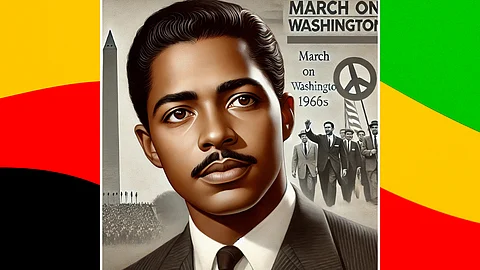
- Home
- About Us
- SOULIVITY TODAY Radio Show!
- COMMUNITY HUB
- GO SHOP by Soulivity!
- ColumnsColumns
- CultureCulture
- Lifestyle
- Contact Us!

Throughout Black history, many figures stand in the spotlight for their courageous efforts in the fight for justice. However, some of the most influential leaders have remained in the shadows, their contributions underappreciated despite their monumental impact. One such figure is Bayard Rustin, a brilliant strategist and organizer whose work shaped the Civil Rights Movement. A mentor to Dr. Martin Luther King Jr. and the chief architect of the 1963 March on Washington, Rustin’s legacy extends beyond racial equality to LGBTQ+ rights and global human rights activism.
Born in 1912 in West Chester, Pennsylvania, Rustin was raised by his grandparents, who instilled in him Quaker values of peace and justice. As a young man, he became involved in social justice causes, particularly in advocating for racial equality. Rustin’s commitment to nonviolence was influenced by Mahatma Gandhi’s philosophy, which he later introduced to Dr. King, significantly shaping the approach of the Civil Rights Movement.
Despite being one of the most effective strategists in the movement, Rustin often worked behind the scenes due to his status as an openly gay man in a time of deep-seated homophobia. His sexual orientation made him a target for critics, both inside and outside the movement, and forced him to take a lower-profile role. Nevertheless, his organizational genius was undeniable.
One of Rustin’s most notable accomplishments was orchestrating the historic 1963 March on Washington for Jobs and Freedom. The event, which drew over 250,000 people to the National Mall, was a turning point in the struggle for civil rights and culminated in Dr. King’s iconic “I Have a Dream” speech. Rustin managed the logistics, ensuring that the massive gathering remained peaceful and impactful.
Rustin’s advocacy extended beyond the Civil Rights Movement. He was a fierce advocate for labor rights, speaking out against economic injustice and working with unions to secure fair wages and conditions for Black workers. Additionally, in the later years of his life, he became a vocal proponent of LGBTQ+ rights, at a time when it was still dangerous to do so.
In 1986, Rustin reflected on his role as a Black gay activist, stating, “The principal factors which influenced my life are nonviolent tactics, constitutional means, democratic procedures, respect for human personality, and a belief that all people are one.” These words encapsulate his lifelong dedication to social justice.
Bayard Rustin passed away in 1987, but his contributions continue to resonate. In 2013, President Barack Obama posthumously awarded him the Presidential Medal of Freedom, finally giving Rustin the national recognition he deserved. His life’s work serves as an enduring reminder that progress often comes from those who work behind the scenes, fighting for justice despite adversity.
As we celebrate Black History Month, it is vital to remember and honor Bayard Rustin’s legacy. His courage, intelligence, and unwavering commitment to justice helped shape the Civil Rights Movement and paved the way for future generations of activists. His story reminds us that true change is driven by those willing to stand firm in their convictions, even when the world seeks to silence them.
Bayard Rustin was a true architect of change—an organizer, mentor, and advocate who championed civil rights and human dignity. Though often overlooked, his impact is undeniable. As we reflect on Black history and the struggle for equality, let us uplift Rustin’s legacy and ensure that his contributions are never forgotten.
